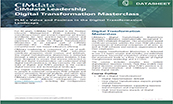Key takeaways:
- More and more manufactured products are smart, and more and more of their value is provided by their electronics and embedded software content
- PTC made a huge move to support their manufacturing customers in getting smart and connected with their acquisition of ThingWorx, a leading provider of “Internet of Things” development tools and infrastructure
- This acquisition, and two other recent announcements by Autodesk and Google, show the importance of smart, connected devices in just about all product markets
When you listen to just about any product ad today, the come-on is not about “new” or “improved.” It is about “smart”: smartphones, smart TVs, smart thermostats, and many other familiar items. IBM’s Smarter Planet campaign is ubiquitous. Firms in many manufacturing industries rely on embedded software and electronics to make their products smarter and more adaptable. They are also delivering more product value through software than ever before. Smart products can also be instrumented to capture data about product conditions and use. For example, logistics has been a long time user of embedded data capture and real-time diagnostics. Technicians can query the device for this data and use it to help define the necessary repairs. Now add connectivity to the mix. All of this captured data can be shared, in real time, to help make better decisions more quickly. The volumes of data can be enormous, and the abilities to manage it and meaningfully analyze it are essential. Companies looking to build smarter products mostly use a roll your own (RYO) approach, cobbling together disparate tools and technologies.
PTC and their most recent acquisition, ThingWorx, want to change that. PTC has many large manufacturing clients that make smart, connected products and these issues are part of PTC’s view of the world presented by Jim Heppelmann, their CEO. ThingWorx is a leading player in the Internet of Things (IoT), providing tools for software development and other supporting infrastructure. As important, ThingWorx has forged many partnerships across the hardware and software infrastructure providers, and are building significant technology themselves. This is clearly of interest to PTC customers making tractors, airplanes, and other smart devices. Of course, PTC hopes that combining ThingWorx with MKS and the rest of their portfolio of PLM enabling solutions will provide competitive differentiation. During their in-depth analyst briefing on January 15, PTC stated that ThingWorx will continue to work independently on building their business, whose vision extends well beyond PTC’s. At least initially, PTC will resell the ThingWorx platform and develop some applications for their core ALM, SLM, and PLM businesses.
This is a big move for PTC, and it cost them big money, particularly in comparison with many of their more recent acquisitions. (PTC paid more than 10-times revenues.) According to their executives, they were independently pursuing IoT tool development when they realized that they could go farther much faster by acquiring ThingWorx. Their tools are impressive, and CIMdata looks forward to getting more than the short demo provided during the announcement. This could also be important to PTC for another reason. ThingWorx provides a platform-independent tool set on which Web, Android, and iOS applications can be developed to provide real-time access to data from a wide range of sources, including other enterprise systems, with no programming required. This data is presented to users in interactive dashboards. This capability could prove valuable to other parts of the PTC portfolio, particularly on the mobile side, which is where the action is today. CIMdata believes this is an exciting move by PTC, allowing them to expand their vision and addressable market, and to help differentiate them from the PLM pack.
Beyond PTC, this announcement is one of three made recently that shows the importance of smart and IoT. Autodesk recently announced their acquisition of circuits.io, a former partner, which operates an on-line electronic design sharing community that makes it easy to make smart devices. We can already buy drones on iTunes, and now both companies and individuals can readily create and interconnect smart devices of their own design. PTC and ThingWorx can help companies interconnect devices, harvest and analyze data, and make the system smarter and more effective. With anyone creating such devices, they can proliferate even faster, if that is possible.
The last announcement was Google acquiring Nest, a leading provider of smart devices for the home, most notably thermostats. If nothing else, this costly purchase ($3.2 billion) helps validate the consumer IoT device market. Many have discussed their motives, but clearly enhanced digital awareness with context is the next data market Google wants to dominate. It’s not enough to know what we are communicating over the Internet, we will also be sharing where we are, what we are doing, etc., with more than our phones. Nest says they will not share such data with Google. But we are moving to a world where just about everything we use, including our clothes, can be sharing status updates.
Where is this going? Is this yet another example of the downside of new technology, with a familiar MO: doing things because we can, not because we should? Amazon could deliver packages using drones, but the mass outcry against it suggests the buying public does not think they should. But these three announcements taken together suggest that wherever this might go, we are going to be able to get there much, much faster. We better be prepared to hold onto something.




